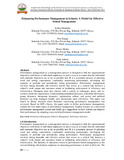Enhancing Performance Management in Schools: A Model for Effective School Management

View/
Date
2019-10-16Author
Manduku, Joshua
Hungai, Pritt
Sikuku, Moses
Adhola, Faith
Metadata
Show full item recordAbstract
Performance management as a management process is designed to link the organizational
objectives with those of individual employees in such a way as to ensure that the individual
and corporate objectives are as far as possible met. It is a systematic process of planning
work and setting expectations, continually monitoring performance, developing the
capacity to perform and periodically rating performance. Performance management
involves taking desirable and effective actions that serves as a critical link between a
school’s work output and outcomes aimed at facilitating achievement of efficiency and
effectiveness. Managers must also interact with a variety of colleagues, peers, and coworkers
inside the organization. Understanding attitudinal processes, individual differences,
group dynamics, intergroup dynamics, organization culture, and power and political
behavior can help managers handle such interactions more effectively. This paper was
based on library research where literature concerning performance management was
reviewed. Based on KPI’s theory, the paper seeks to define performance management,
explain the four main stages of performance management. Explain features of a successful
performance management system and finally give suggestions on how schools can improve
their performance by adopting a successful performance management model.
